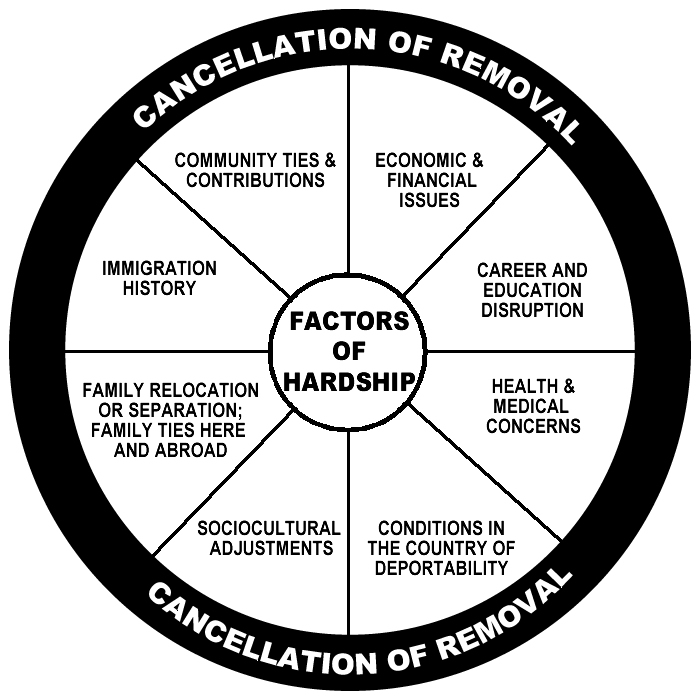This blog post is Part 1 of our Mini-Series On Cancellation Of Removal for non-lawful permanent residents, an important component of our deportation defense services.

Time and time again, immigrants facing deportation are baffled when I explain their family’s hardship may not be strong enough to win their Cancellation of Removal case.
“I’m the main breadwinner,” they explain. “If I’m not here, how will my wife be able to pay the house bills, feed my kids, and keep them clothed?”
“Isn’t this hardship?”
“Yes, it is,” I explain, “but for immigrants living here without permission, hardship under Cancellation of Removal means the worst of the worst situations.”
Immigration Hardship Is A Matter Of Severity
In non-permanent resident cancellation of removal defense cases, to win, immigrants must show their family members will suffer an “exceptional and extremely unusual hardship.”
To simplify the issue, I often use an example of a judge who has 100 or more cases involving immigrants in a similar situation.
Only 10%, or less, will win. Only 10%, or less, will have their deportation canceled by the judge. Only 10%, or less, will be granted permanent residence status.
The judge, I stress, weighs the total hardship of each undocumented immigrant’s family and chooses which families will suffer the most severe hardship.
Listen to Carlos explain the difference between proving extreme hardship versus ordinary hardship.
Of course, my experience as a Riverside immigration lawyer has shown the realities of immigration court proceedings are far more complicated.
Sometimes immigration judges overlook, ignore, or trivialize important factors.
Judges are not always consistent in weighing the hardship of one immigrant family vis-à-vis those from different families. They are not always fair in determining the degree of suffering which will be imposed on immigrant families due to the deportation of their loved ones.
Moreover, the analysis of hardship is not an exact science.
Traditional Factors Of Immigration Hardship
There is no precise list of what factors constitute hardship.
Hardship is determined case-by-case. It depends on the circumstances unique to each immigrant’s case.
Over 30 years ago, in Matter of Anderson, the Board of Immigration Appeals set forth a list of factors which should be part of hardship calculations in deportation cases:
- Age of the subject;
- Family ties in the U.S. and abroad;
- Length of residency in the U.S.;
- Conditions of health;
- Economic and political conditions in the country to which the alien is returnable;
- Financial status, business and occupation;
- The possibility of other means of adjustment;
- Whether the applicant has been of special assistance to the U.S. or community;
- Immigration history; and
- Position in the community.
Anderson remains good law today, even though its precise applicability to the newer exceptional and extremely unusual hardship standard has not been clarified by the Board of Immigration Appeals.
In this discussion, Carlos shares why your evidence is crucial to show the difference between ordinary and extreme hardship.
What Is The Totality Of Hardship Circumstances Test?
In short, the Anderson decision outlined a framework judges are still required to follow today.
To adequately evaluate hardship, the Board emphasized, the totality of circumstances must be examined.
The Anderson list is not complete. In fact, no list of hardship factors can be exhaustive. Every family has a different set of circumstances.
For instance, the concept of hardship is a requirement in various sections of immigration law besides Cancellation of Removal. And under provisions like INA 212(c), 212(h). and 212(i), hardship has been defined by reference to some similar, and some different, considerations.
Nonetheless, I believe if they are relevant, they should be part of a thorough evaluation given any family situation under a totality of the circumstances test.
Even the Obama administration’s new 19-point prosecutorial discretion checklist includes several hardship elements which can be raised by Cancellation of Removal attorneys at removal hearings. Some are not part of the original Anderson list.
Yet, far too often, clients visit my office after losing their case at immigration court based on a failure to prove hardship. They do not feel the immigration judge gave them a fair shake.
Over the years, as an immigration appeals attorney, I’ve learned if relevant factors of hardship were not weighed adequately, the judicial errors will primarily fall into two categories
It is not enough in Cancellation of Removal proceedings for judges to merely pay lip service to a wide range of factors bearing on hardship.
Each hardship factor must be evaluated individually. Judges are required to weigh the evidence presented by an immigrant, in a manner specific to that immigrant’s case, and not how such evidence generally affects immigrants from similar backgrounds.
Additionally, judges must assess the cumulative effect of all hardship factors. It’s rare that any single factor on its own, or any one family member by himself, can establish the requisite hardship. More often, the aggregate impact of various factors, upon the lives of various family members, leads to a determination of exceptional and extremely unusual hardship.
The reality is any factor of hardship which adversely affects the U.S. or lawful permanent resident relative of an undocumented immigrant – a spouse, child, or parent – is pertinent to the court’s decision.
This means immigrants should leave no stone unturned when presenting their defense against deportation under Cancellation of Removal.
By Carlos Batara, Immigration Law, Policy, And Politics
You can find the other blog posts in our four-part Mini Series On Cancellation of Removal for non-lawful permanent residents here:




